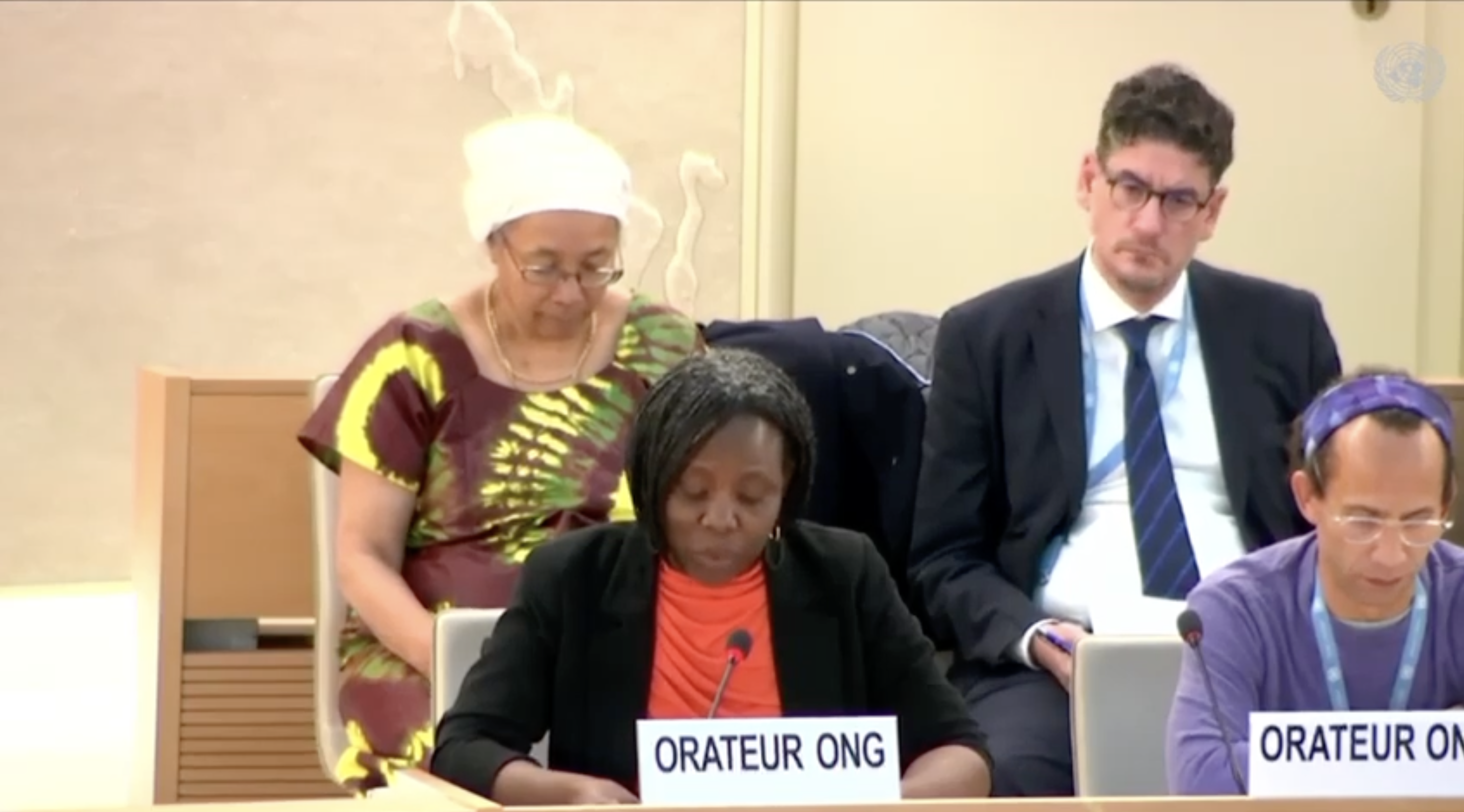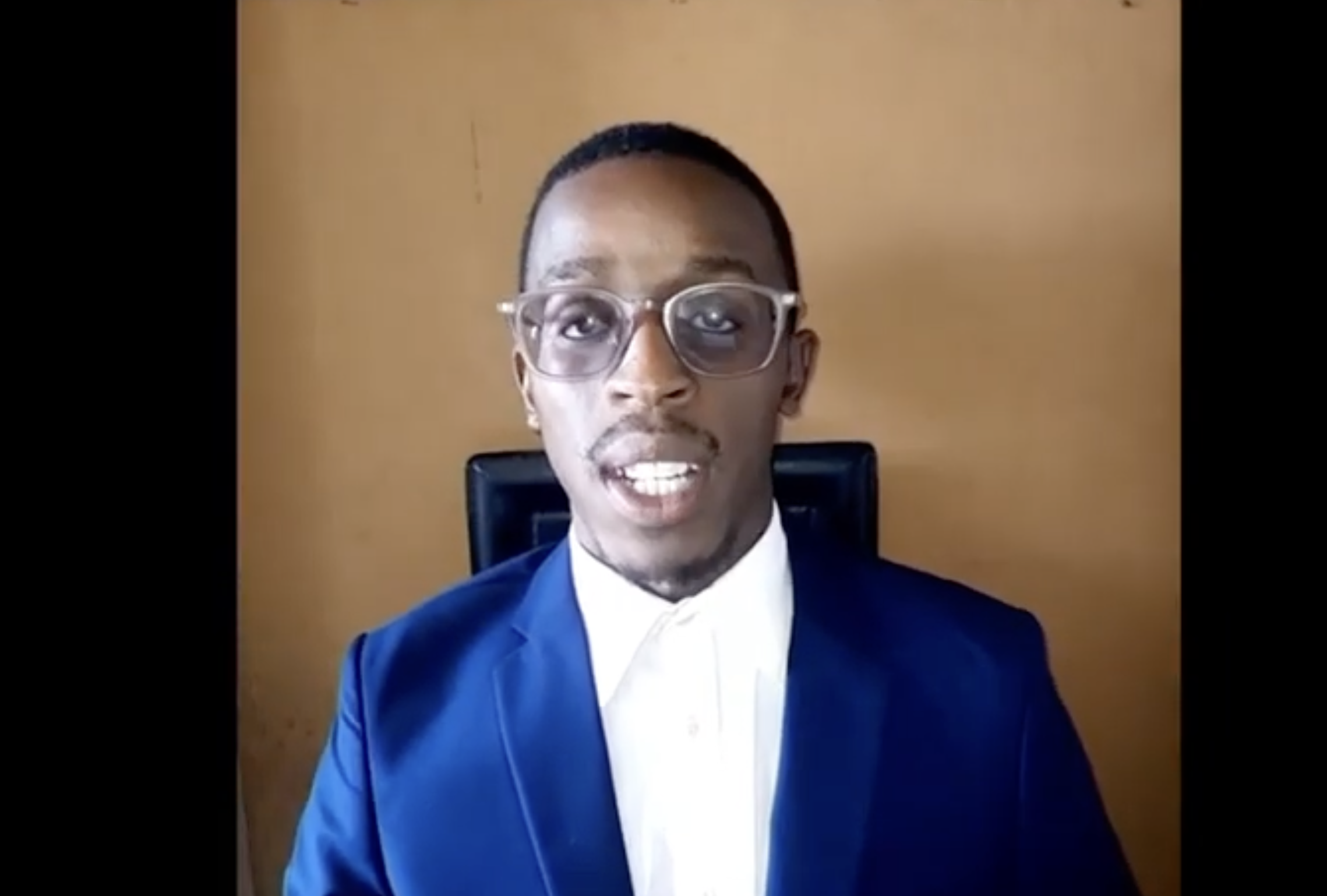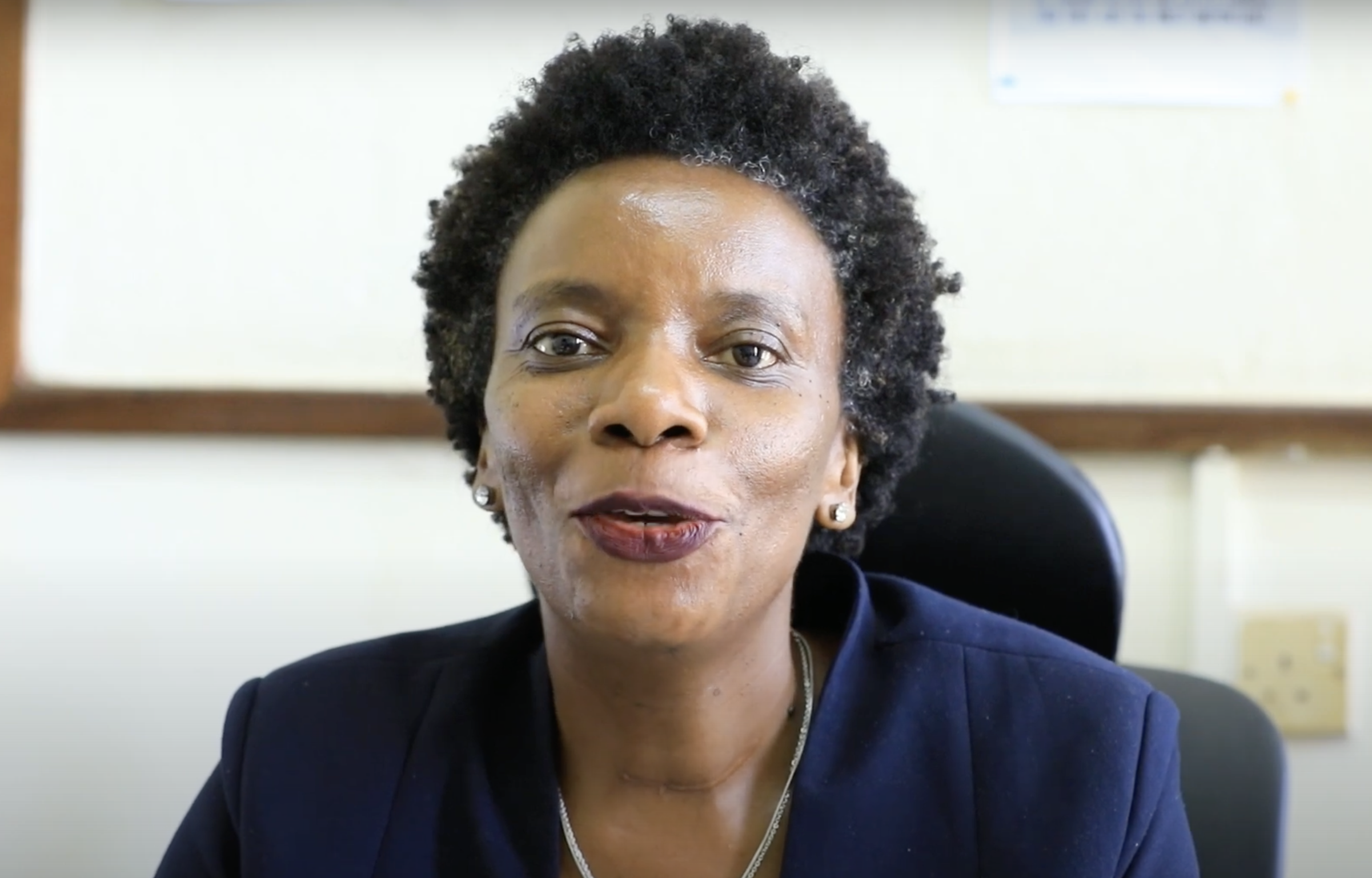The 56th Session of the Human Rights Council
20 June 2024
Item 2 – Internal Dialogue with Special Rapporteur in Eritrea
26 July 2024
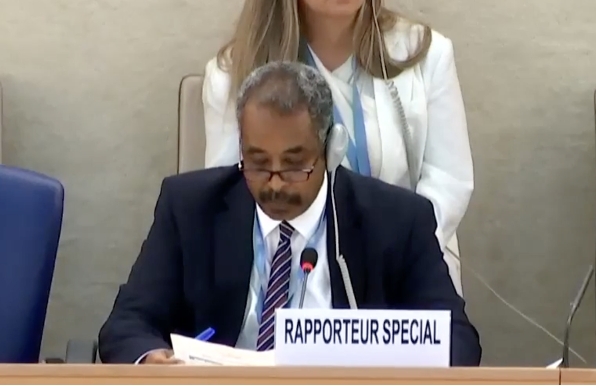
By Easha Madappa / GICJ
Executive Summary
On 20 June 2024, the 5th and 6th meetings of the 56th Regular Session of the Human Rights Council considered the report of Mr. Mohamed Abdelsalam Babiker, Special Rapporteur on the Situation of Human Rights in Eritrea (A/HRC/56/24), during an interactive dialogue on the same topic.
Mr. Mohamed Abdelsalam Babiker opened the interactive dialogue by presenting the findings of his latest report, which focused on the ‘dire human rights situation in Eritrea.’ Pertinent were several human rights violations including arbitrary detention, enforced disappearances, and the systemic repression of three key freedoms: expression, assembly, and religion.
The Special Rapporteur pointed out a glaring gap between Eritrea's declared commitments to human rights and the reality on the ground, recalling that Eritrea has not implemented any of the recommendations made at its previous Universal Periodic Review (UPR) in January 2024. Further, the report concludes, justiciability for past and ongoing human rights infringements are null, with no person being held accountable for any of the crimes against humanity discovered by the national commissions of inquiry, specifically enslavement, imprisonment, enforced disappearances and torture.
Various delegations raised concerns about Eritrea’s lack of commitment and cooperation with international human rights mechanisms both at the regional and universal level. Generally, delegations centred their assessment on the metrics of harassment, arbitrary and indefinite detention of religious and political figures, and the absence of civic society in the region.
Civil society groups largely concurred with the recommendations of the Special Rapporteur, urging States to condemn such ‘blatant’ human rights abuses in Eritrea. NGOs encouraged States to provide protection and support to Eritrean refugees and asylum seekers, who are under significant threat, including trafficking and kidnapping, particularly in Ethiopia, Sudan and Libya.
In his concluding remarks, the Special Rapporteur highlighted that State efforts must affect just and humane outcomes through constructive engagement with Eritrea, the provision of technical assistance, and upholding of international human rights standards to ensure accountability and protections for all Eritreans.
The Geneva International Centre for Justice (GICJ) congratulates the Special Rapporteur for their report regarding the suppression of rights and freedoms by the Eritrean government. We remain extremely concerned about the above-mentioned findings and join the Special Rapporteur in urging States to maintain scrutiny of Eritrea and enhance efforts to facilitate justice for victims of human rights violations.
Report of the Special Rapporteur on Human Rights Denial in Eritrea
The report of the Special Rapporteur (A/HRC/56/24) focuses not only on persistent human rights violations in Eritrea, but the lack of substantive progress achieved in two main capacities - those rights infringed endogenously, and within the diaspora.
The report begins with an acknowledgement of Eritrea’s outright refusal of the mandate and non-issuance of official visitation to the Special Rapporteur, thus inhibiting his ability to gather information and exchange views with the Eritrean authorities. Hence, the report is evidenced by interviews with families of victims, first hand witnesses and members of the diaspora.
Divesting the ‘on the ground’ reality, the Special Rapporteur paid special heed to the continued practice of arbitrary and incommunicado detention in Eritrea. The increased presence of Eritrean troops in the Tigray region has heightened volatility and threatened peace at the Ethiopian-Eritrean border in an irreconcilable way. The bilateral efforts of the Ethiopian and Eritrean government, by way of a 2018 peace agreement, are defiled by this presence of Eritrean troops. The Special Rapporteur finds that individuals, including journalists, human rights defenders, political dissidents, farmers and civilians alike, are routinely detained for indefinite periods without formal charges or due process. Additionally, there exists numerous cases of enforced disappearances and covert extra-judicial killings, causing profound distress to families and communities of Tigrean detainees who have remained uninformed on their whereabouts.
Within his remarks to the Council, the Special Rapporteur called upon Eritrea to comply with the 2018 Peace Agreement and 2002 Ethiopia-Eritrea Boundary Commission decision that the rights of local citizens in contested areas must be duly protected. This includes, the allowance of due process and procedural fairness for those detained, such that they receive a fair trial, just cause for arrest and are subject to humane conditions of detainment. The Special Rapporteur also demanded the immediate release of those arbitrarily detained and for Eritrean authorities to withdraw from this region.
Salient in this report, are the Special Rapporteur’s observations that the arbitrary detentions have ensued alongside religious and political persecution, warranting large clashes between the government and political dissonants. These situations of violence have resulted in a hundred injured, dozens arrested, innumerable public spaces destroyed and defaced, and five Eritreans killed in Israel. The government has thus been called upon by the Special Rapporteur to refrain from their undue interference in private lives and their abhorrence of liberty. Additionally, the Special Rapporteur finds that authorities have reached borders to control diaspora politics and silence pro-democracy activities, calling for an immediate halt to these activities and the de-escalation of violence in the diaspora.
The Special Rapporteur highlights renewed arrests of religious leaders and the suppression of non-recognised religious practices. At present there are four government authorised religious denominations; Roman Catholicism, Lutheranism, Sunni Islam and Eritrean Orthodox Tewahedo. Those outside these four denominations have been subject to raids at places of worship and congregation, where many leaders and adherents have been detained indefinitely. The main groups targeted are the Full Gospel Church, Evangelists, and Jehova’s Witnesses. Some detainees have reportedly died in custody after prolonged periods of detention, such as a leader of the Full Gospel Church, Reverend Araya who was detained without a charge or trial date for three years. These prolonged periods of detention can last up to twenty years.
Indeed, the report underscores the many social implications of religious persecution including that women and children of non-authorised religions are being denied food and ration cards, full citizenship benefits, admissions to school, right to participate in national rituals (such as signing the anthem/ parades) and rights to employment. There is also a scarcity of burial sights for such adherents, or the blatant refusal of such spaces causing profound distress to families, highlighting the severity of religious repression in the country.
Further, the report details the systematic suppression of freedoms of expression and assembly. These suppressions remain the crux of the Special Rapporteur’s findings as the government exercises restrictive control over public life through the closing of civic spaces. The report deduces a lack of independent media as the government owns all print, television and radio broadcasts. Internet penetration is also very low in Eritrea, limiting access to independent online sources, while many websites, social media accounts or applications critical of the current regime are blocked by the government. Sixteen journalists have been missing since 2001, making them the longest detained (presumably) journalists in the world.
The report also evidences that civil society organisation participation is effectively stifled as The government represses all forms of dissent or any “divergent” behaviour that could be perceived to be against the Government or interpreted as a sign of disloyalty. Indeed, the Special Rapporteur highlights that the ruling party, the People’s Front for Democracy and Justice, continues to be the only authorised political party in Eritrea. The Special Rapporteur notes that the Working Group on Arbitrary Detention and international civil society organisations are concerned that journalist Dawit Isaak has been arbitrarily detained, while his colleagues are held in circumstances amounting to enforced disappearance. As such there exists at present, several targeted sanctions recommendations in various jurisdictions against President Afwerki, and senior Eritrean officials on the grounds of ‘crimes against humanity’ committed against Mr. Isaak and his colleagues. The Special Rapporteur holds that such curtailments on the freedom of expression has a negative causal link to the ability for Eritrean nationals to assemble.
Further, the report identifies an evolving trend of transnational repression, where Eritrean authorities silence diaspora communities abroad through methods including kidnappings, smear campaigns, denial of consular services, and social isolation. Such an approach has retraumatised victims of human rights violations and fostered perpetuated fear and self-censorship among Eritreans abroad. The Special Rapporteur highlights that this hinders the ability for diaspora members to organise in host countries, and increased polarisation amongst members.
The report further discerns a resultant displacement crisis, with over 17% of Eritreans seeking asylum abroad. The Special Rapporteur highlighted that within this diaspora exists perpetuated fear and self-censorship, due to the rampant religious repression in the region. The report finds the Eritrean government has, extraterritorially, silenced pro-democracy activists, human rights defenders, politicians and journalists in neighbouring regions such as those in Tigray. Hence, the Special Rapporteur remains concerned about the dangers faced by Eritrean refugees and asylum seekers, including trafficking, kidnapping, and violence. The Special Rapporteur urges host countries to ensure protection for these vulnerable populations and to respect the principle of non-refoulement.
Further, the Special Rapporteur’s report additionally raises concern over rigid State policies such as indefinite and compulsory national service that have amounted to forced labour and inhumane treatment, further exacerbated by the Tigray conflict. The report underscores how several international human rights standardshave been violated as individuals in national service are subject to in some cases, torture. The Special Rapporteur deduces that despite having a legislative 18-month duration exists for national service, but this is loopholed as Eritrea declared a state of emergency in 1998 which was never altered, thereby subjecting conscripts to a perpetual state of mobilisation.
Despite peace agreements with Ethiopia and a Cessation of Hostilities Agreement with the Tigray People’s Liberation Front in November 2022, Eritrean authorities continue massive round ups of draft evaders and force them to national service. And, as conscientious objection is also not authorised on the grounds of religion, the Special Rapporteur finds that the subjugation and enslavement of conscripts is ratified at law. Indeed, they are also given meagre pay, denied permission to frequently visit family, subject to harsh working conditions and women conscripts are at heightened risk of sexual violence.
Concerning the Special Rapporteur is the absence of accountability mechanisms for past and ongoing human rights violations. In the report, it is emphasised that no individuals have been held responsible for the crimes against humanity documented by the Commission of Inquiry on Human Rights in Eritrea in 2016 and 2017, nor is there an impartial judicial body to review government decisions. Additionally, the Special Rapporteur notes that Eritrea has not implemented the vast majority of recommendations from previous Universal Periodic Reviews, despite accepting 131 of the 261 recommendations.
The report concludes with a call for sustained international scrutiny of Eritrea's human rights situation. The Special Rapporteur ushers States to support civil society efforts, exercise universal jurisdiction where appropriate, and engage constructively with Eritrea while providing technical assistance. Indeed, he emphasises that without significant changes and measures to address these issues, ongoing human rights violations will continue to undermine peace, stability, and development in the region.
The report underscores the critical need for the international community to maintain pressure on Eritrea to improve its human rights record. In light of the above findings, the Special Rapporteur calls for a coordinated and sustained effort to support the Eritrean people in their pursuit of fundamental rights and freedoms, and to hold the government accountable for its obligations under international human rights law.
Interactive dialogue on the Special Rapporteur Report
During the interactive dialogue at the 56th Regular Session of the Human Rights Council, the Special Rapporteur urged nation States to facilitate justice for those subjected to the HR violations in Eritrea by maintaining scrutiny, supporting civic society and exercising their universal jurisdiction.
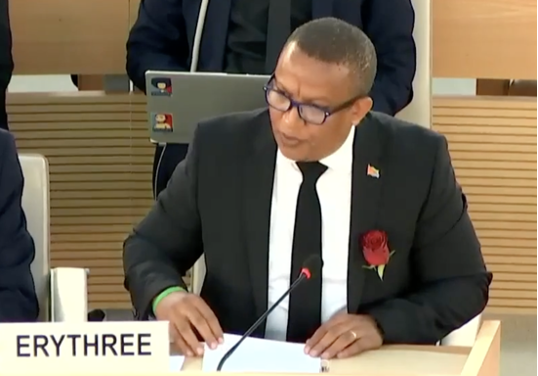 The Delegate for Eritrea responded to the Rapporteur by expressing their disdain for the intrusive nature of country specific mandates. Recalling the Council’s inclination to the Western or ‘free world’, the Delegate illustrated Eritrea’s deep history of imperial rule and struggles for liberation. The Delegate alluded that members of the Council both endorsed the mandate while engaging, by proxy, in the border conflicts within the region. In delineating the core values of the Eritrean government; security, human development and dignity, the Delegate highlighted the heightened necessity of the National Service.
The Delegate for Eritrea responded to the Rapporteur by expressing their disdain for the intrusive nature of country specific mandates. Recalling the Council’s inclination to the Western or ‘free world’, the Delegate illustrated Eritrea’s deep history of imperial rule and struggles for liberation. The Delegate alluded that members of the Council both endorsed the mandate while engaging, by proxy, in the border conflicts within the region. In delineating the core values of the Eritrean government; security, human development and dignity, the Delegate highlighted the heightened necessity of the National Service.
The Delegate reflected that Eritrea relies steadfastly upon the National Service to uphold security and peace, as there is a ‘continued and prolonged’ struggle for justice, human rights and freedom in the region. Given the meeting took place on the nation’s Martyr's day, the Eritrean Delegate used the last minute of their response to commemorate their fallen martyrs and heroes of the national service. Indeed, the Delegate’s statement reflected the lack of moral authority Eritrea believes the Council holds in enforcing the mandate.
The European Union Delegate welcomed the improvements made by the Eritrean government with respect to health and education, but remained concerned about arbitrary detention, closed civic space, absence of rules of law. She began with an endorsement of the Special Rapporteur’s mandate, and echoed the need for Eritrea to improve its cooperation in realising the recommendations made. The Delegate reiterated the need to withdraw Eritrean troops from Tigray and reveal the location of political dissonants held in arbitrary detention. She went on to condemn the prevalence of sexual violence and forced national service, amplifying the need to eradicate discriminatory policies as part of the mandate. The Delegate expressed that the EU intends to continue engagement with Eritrea on the basis of a comprehensive, constructive, and long term approach, while also asking the Special Rapporteur to divest the status of children in the region.
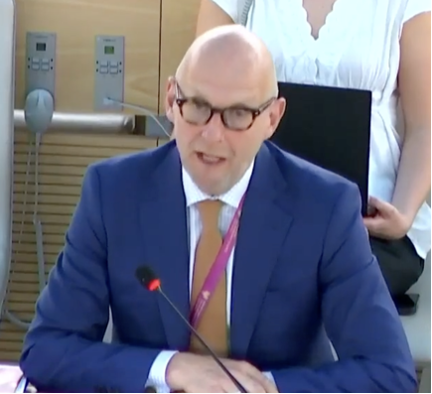 The Nordic and Baltic States, represented by the Delegate of Norway, reaffirmed much of the EU’s concerns, but stressed the need to grant the Special Rapporteur full and unhindered access to information and entry into the region. The Delegate also called on the Eritrean government to engage in thorough investigations of breaches of international law in the Tigray region as priority. He also necessitated the establishment of independent regulatory frameworks to protect human rights and uphold the rule of law, as it is currently absent, and condemned violations of human rights ongoing in indefinite national service. Notably the representative wished to know how their state could facilitate justice in Eritrea, and asked the Special Rapporteur of how to best support human rights defenders and civil society organisations in their efforts to advocate against human rights violations.
The Nordic and Baltic States, represented by the Delegate of Norway, reaffirmed much of the EU’s concerns, but stressed the need to grant the Special Rapporteur full and unhindered access to information and entry into the region. The Delegate also called on the Eritrean government to engage in thorough investigations of breaches of international law in the Tigray region as priority. He also necessitated the establishment of independent regulatory frameworks to protect human rights and uphold the rule of law, as it is currently absent, and condemned violations of human rights ongoing in indefinite national service. Notably the representative wished to know how their state could facilitate justice in Eritrea, and asked the Special Rapporteur of how to best support human rights defenders and civil society organisations in their efforts to advocate against human rights violations.
A group of Latin American States, represented by the Bolivian Delegate, raised concerns about the nature of country specific mandates and how the proliferation of investigative mechanisms and need for reform are heavily politicised. The representative questioned the credibility of the research of the report and stated that it lacked objectivity as it relied on Anonymous selected unreliable sources and propaganda leaflets. It condemns the lack of consent obtained by the concerned country to conduct research and reiterated that human rights approaches must remain not politicised with respect for national sovereignty.
This was a popular view echoed by many delegations, including the Delegate for Sri Lanka who spoke to the polisarising and unproductive nature of country specific mandates, as having a limiting effect on constructive dialogue. Saudi Arabia’s Delegate and the representative for the People’s Republic of China reiterated the inefficiency of debate as the Council was stifled by a lack of Eritrea’s consent. The latter makes specific mention of the Council’s tendency to suppress developing nations. The Democratic People’s Republic of Korea found such mandates to be immoral and supported the aforementioned statements.
The Delegate of Cuba took the same stance, invoking principles of the UN Charter as contrary to that of country specific mandates. Indeed, the lack of consensus or agreement by Eritrea was rejected by this delegation as irrelevant to the carrying out of the mandate. The representative found that human rights matters are manipulated and that this mandate was extremely selective as it furthered imperialist agendas of furthering political interference in the region. They posed the question of why specifically Eritrea was focused on when no country is immune to many of the curtailments of rights covered in the report.
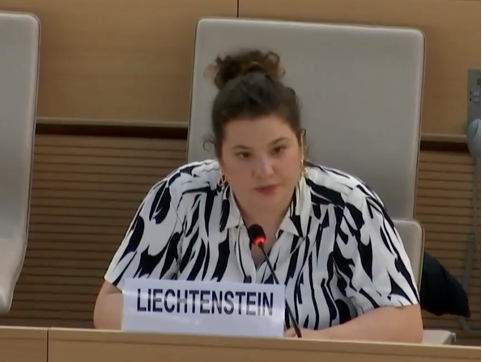 Conversely, the Liechtenstein Delegate began by recalling the dire situation of human rights in Eritrea existed largely due to non-cooperation with availed international and regional human rights mechanisms. The mention of deploring freedoms and continued suppression of civic society aligned this Delegate with the stance of the European Union, as this representative too declared that all enforced disappearances must be investigated. Interestingly, the Delegate of Liechtenstein posed a question on transparency efforts and how best the international community could support the recording of casualties and forensic investigations in Tigray. The Special Rapporteur responded to this in his concluding remarks by stating that specific accountability mechanisms and frameworks had to be set up by the State that pertained to the mandate of the Special Rapporteur.
Conversely, the Liechtenstein Delegate began by recalling the dire situation of human rights in Eritrea existed largely due to non-cooperation with availed international and regional human rights mechanisms. The mention of deploring freedoms and continued suppression of civic society aligned this Delegate with the stance of the European Union, as this representative too declared that all enforced disappearances must be investigated. Interestingly, the Delegate of Liechtenstein posed a question on transparency efforts and how best the international community could support the recording of casualties and forensic investigations in Tigray. The Special Rapporteur responded to this in his concluding remarks by stating that specific accountability mechanisms and frameworks had to be set up by the State that pertained to the mandate of the Special Rapporteur.
Of the same view were the Delegates of France and Luxembourg who spoke about the extent of systemic oppression in Eritrea and resultant impunity. The Delegate of France specifically reiterated that as a member of the Council Eritrea has a positive obligation to uphold civil and political rights and is bound by these shared values. These delegations joined the European Union in asking the Special Rapporteur about rights of children impacted by national service. The Special Rapporteur responded in his final remarks that children in their final year of highschool are frequently conscripted, hindering their ability to conclude their education and obtain qualifications on par with children of other States. In fact, he recalled the need for imminent reform with respect to indefinite service as there was a high dropout rate at schools, where students are being conscripted in person by way of attendance, limiting their access to safe and free spaces.
 The Delegate for the UK appealed to Eritrea’s focus on development and prosperity contemporaneously with the views above, and stated that economic opportunities may be diversified or refreshed when Eritrea engaged more meaningfully with the UPR process and treaty monitoring bodies. The representative reminded the Council that the UK continues to engage with Eritrea both within the Council and bilaterally, and is committed to realising the recommendations outlined in the report.
The Delegate for the UK appealed to Eritrea’s focus on development and prosperity contemporaneously with the views above, and stated that economic opportunities may be diversified or refreshed when Eritrea engaged more meaningfully with the UPR process and treaty monitoring bodies. The representative reminded the Council that the UK continues to engage with Eritrea both within the Council and bilaterally, and is committed to realising the recommendations outlined in the report.
The Delegate for Ukraine reflected the broader geo-political context and unequivocally condemned the autocratic politics of Eritrea, as the foundation for grave infringements of human rights. Indeed, Eritrea supports Russia’s war of aggression against Ukraine and this works against the Council’s purpose. The Delegate urged that all credible allegations be investigated with accountability mechanisms strengthened for war crimes committed by armed forces in the Tigray region. They underscore this is only possible with close engagement with the Special Rapporteur and their recommendations.
Indeed, many of the European and Western nations stood firmly in their endorsements of extending the mandate’s timeframe and geographical scope, and holding Eritrea accountable at an international level. However, the most imminently affected were the neighbouring countries and the African Group.
 The Delegate for Ethiopia remained deeply saddened by the scope of the mandate and its attempt to interfere in internal affairs. The representative spoke squarely on the need for the Special Rapporteur to comply with state sovereignty and negotiated peace agreements between the sister nations. The Delegate reiterated Ethiopia’s open door policy for refugees and asylum seekers, and their firm commitment to protect concerned peoples. They echoed that technical cooperation mechanisms and complimentary action to existing domestic efforts are most productive with respect to Ethiopia, while urging the termination of the mandate.
The Delegate for Ethiopia remained deeply saddened by the scope of the mandate and its attempt to interfere in internal affairs. The representative spoke squarely on the need for the Special Rapporteur to comply with state sovereignty and negotiated peace agreements between the sister nations. The Delegate reiterated Ethiopia’s open door policy for refugees and asylum seekers, and their firm commitment to protect concerned peoples. They echoed that technical cooperation mechanisms and complimentary action to existing domestic efforts are most productive with respect to Ethiopia, while urging the termination of the mandate.
Conversely, the Delegate for Djibouti denounced the Eritrean governments detention conditions and denial of procedural fairness. This is because there are currently thirteen Djoubotin prisoners of war in Eritrea, who fall under the paragraph 88 [Special Rapporteur’s report] incommunicado detainees, categorically. The Delegate urges these prisoners to be released and information to be shared immediately, as previously they have raised concerns to the Council on this very matter which has been squarely ignored by Eritrea. The Delegate also finds it pertinent to involve the ICRC in the process of information sharing as the relevant stakeholders are partaking in a non-international armed conflict. The Delegate however remains hopeful that relations can be normalised with Eritrea if they exhibit a commitment to resolve this issue.
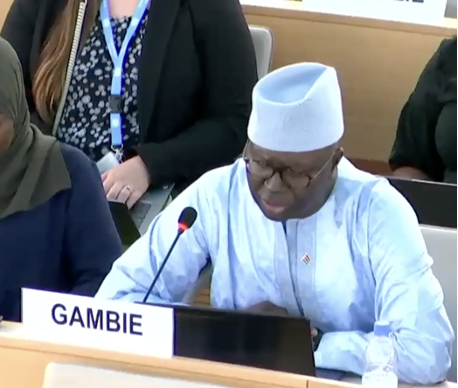 The African States group, represented by the Delegate of Gambia, recalled General Assembly resolution 60/251 and affirmed that human rights must be protected universally with objectivity and non-selectivity. This Delegate put forth that blatant politicisation of human rights and double standards were triggered as part of the mandate, which they deemed counterproductive and confrontational. The Delegate drew a specific link to peace, development and human rights, asserting that all members of the Council should work to peace processes and efforts in the region, and that positive engagement and cooperation can be effective means of upholding HR in all countries.
The African States group, represented by the Delegate of Gambia, recalled General Assembly resolution 60/251 and affirmed that human rights must be protected universally with objectivity and non-selectivity. This Delegate put forth that blatant politicisation of human rights and double standards were triggered as part of the mandate, which they deemed counterproductive and confrontational. The Delegate drew a specific link to peace, development and human rights, asserting that all members of the Council should work to peace processes and efforts in the region, and that positive engagement and cooperation can be effective means of upholding HR in all countries.
Like many of the Asian, Middle Eastern and African delegations, they stated that the Special Rapporteur’s mandate should be cut short and instead local cooperation and constructive dialogue efforts should be strengthened. They welcomed Eritrea’s progress and commitment to the UN, specifically Eritrea’s expressed consent to implement UPR recommendations. They referred the African Commission for People and Human Rights and the African Union Peace and Security Council as appropriate avenues to review Eritrea’s implementation of recommendation and State policies, welcoming their initial and combined reports to the Council. The Delegate of Sudan associated with the African Group.
A number of civil society organisations were subsequently permitted to speak on the report’s findings, all reiterating that every aspect of life in Eritrea is suppressed and confined. The NGOs welcomed the report of the Special Rapporteur and the focus on arbitrary detention, absence of civic society, torture and violence, and displacement.
Emphasis was placed on warfare and conflict, and the tangible effects this produced. The lack of consideration for public services rendered hospitals barely functional with a shortage of resources and essential medicines, as well as frequent power outages. The representative found this to be a dire situation given the atrocities taking place in what they described as a ‘fear dominated region’. Indeed, the constant state of fear and suppression locals are subject to catalysed their exodus from Eritrea to other neighbouring States, however this Delegate remained cognisant of a lack of future in these regions too. This is because many asylum seekers and refugees are enslaved into forced labour and sexual servitude. Additionally, there is no existing legal avenue to establish innocence of detainees at present, another reason raised by the Delegate to renew the mandate.
Further these organisations argued that there are no discernible UN biases against Eritrea to call into question the legitimacy of this mandate per the conclusions reached by the African Commission of Human Rights. This Delegate reinforced the need for States to look beyond Eritrea’s lack of consent and extend the mandate both temporally and geographically to the diaspora. Indeed, this Delegate finds Eritrea to make a mockery of membership standards and is joined by other NGOs to persuade apt international recognition of rescinded obligations. The Special Rapporteur responds to this Delegate’s request of extending the mandate by recalling that his current mandate extends to Tigray, those deported to Eritrea with no due process, asylum seekers in neighbouring countries and the global diaspora.
Finally, some NGOs raised specifics on detained and seized individuals, as well as empirical data of victims of human rights abuses. Indeed, both organisations affirmed that Eritrea’s time on Council is set to expire with no efforts taken to implement any recommendations made. In particular, Amnesty International called for the extension of the mandate, and a focus on efforts to collect and preserve investigative evidence, as this currently remains inconsistently managed.
Concluding Remarks
In their final statement, the Special Rapporteur echoed an appreciation of Eritrea’s enhancement of education and health related rights, and their commencement of UPR recommendation adoption, but asserts that this has not gone far enough. He directly responded to the many States calling for cooperation with Eritrea, seeking to terminate the mandate. The Special Rapporteur stated many attempts have been made to establish constructive and genuine dialogue with Eritrea, who have refused to comment and respond over a sustained period of four years to their reports, both through national government and the permanent mission in Geneva. Effectively, Eritrea’s diplomatic arms are failing to cooperate and participate in a dialogic process with the Council. Further, the Special Rapporteur finds that positive cooperation, notice and interaction are achieved by way of the interactive dialogue at the Council. Engagement and dialogue may only happen at a supranational level in this specific domain. Further, cooperation and engagement is yet to be evidenced by Eritrea as they have availed no actual means to implement their recommendations, beyond a mere recognition of 131 recommendations. The Special Rapporteur highlighted that the purpose of the Council is to provide an international mechanism to address shortcomings in human rights implementations and urge States to support the renewal of the mandate. He reminded members the Council’s role pertains defending, discussing and improving the grant of human rights. Indeed, the survival of the mandate depends on staunch support and assistance, as the Special Rapporteur calls on member States to maintain ‘watchful eyes’ on the Eritrean government and endorse this continued investigation.
Position of Geneva International Centre for Justice
GICJ remains reiterative of the Special Rapporteur's calls to squarely defend human rights in Eritrea. We remain extremely concerned about the various curtailments of basic civil freedoms, access to justice and lack of peace in the region. Indeed, it is necessary that Eritrea implements the UPR’s recommendations wholly and fully in order to facilitate stability in the region, as their abject lack of progress is concerning to our organisation. However, we remain cognisant of the Council’s predisposition to politicise human rights and further the presence of neoliberalist involvement in the region, as highlighted by the Eritrean delegation. As such, we condemn any such proxy conflicts, political involvement and imposition of Western imperialism in Eritrea as contrary to human rights principles. Given the lack of consent with country-specific mandates, GICJ reiterates to members of the Council the principles of sovereign equality and territorial integrity.
Consequently, we join the Special Rapporteur in urging States to partake in concerted efforts to scrutinise, aid and facilitate justice for Eritrean victims of human rights violations. This may only be realised with constructive engagement with the Eritrean government and the provision of technical assistance. It is imperative that States assist Eritrea in bridging gaps with respect to impunity, detention, the administration of justice and the expression of basic freedoms due to the universality of human rights. GICJ also calls on States to safeguard the rights and offer protections for those seeking asylum from Eritrea, as they are at heightened risk of transnational repression, kidnapping, and human trafficking.
GICJ joins in commending the efforts of the Eritrean government thus far in enhancing social rights through their efforts to health and education but stands firmly with the Special Rapporteur that burdens on civil and political rights must be alleviated with priority. Indeed, opening up civic society, independent media, political infrastructure, and robust opposition are all obligations that Eritrea owes by being a member of this Council alone. Eritrean nationals must also be allowed to conscientiously object from national service nor be subject to inhumane working conditions while in service. Thus, GICJ echoes the Special Rapporteur’s request for a robust and long-term plan to ensure and protect the human rights of Eritrean citizens, both endogenously and within the diaspora.
#Eritrea #freedoms #asylumseekers #religion #detention #diaspora #HumanRights #Geneva #geneva4justice #Justice #GICJ #GenevaInternationalCentreForJustice




